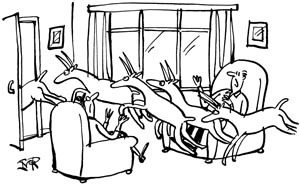Having been a monarchist all my life, it was a bit embarrassing the other day to have to admit to a television interviewer that I could not remember the reasons why I had become one in the first place. In truth, of course — as I explained — I became a monarchist as a matter of course, pretty well by instinct; everybody was doing it. So I did it. The interviewer was not impressed. ‘Sounds like prejudice to me’, he said, putting me to shame. Now, along comes the highly cerebral prison doctor, Theodore Dalrymple to assure me that I was wrong to be ashamed. Prejudices of that kind, he argues, are a thoroughly good thing and the sooner we get back to being a nation which imbibes its sense of right and wrong, and of manners and morals, with its mother’s milk, the better all round.
Not that his nostalgia for the old prejudices includes racism, which is another one that I briefly shared, this time inheriting it from my father who had lost all his money farming tobacco between the wars in what was then Southern Rhodesia He really was one of the old school who believed that blacks had just come down from the trees. In spite of hating that kind of coarse language and thinking, I did believe that white supremacy, at any rate for the foreseeable future, was the best bet for all concerned — a view to which many are now returning.
I am over simplifying. The great doctor’s book is very learned and subtle. Here, for example, are a few of the chapter headings which give an accurate idea of its tone, scope and depth. ‘The Effect of Pedagogy Without Prejudice’; ‘Prejudice a Requirement of Benevolence’; ‘No Virtue Without Prejudice’; ‘Projection of Prejudice Not a Good in Itself’ and so on. Plenty of spicy and appetising food for thought — more than a snack but just short of a heavy meal — all of which, taken together, adds up to a formidable case against encouraging individuals — as is the current practice — to think that they have the right and even the duty to be their own priests, teachers and disciplinarians. Not only is this because, relying on their own small pool of knowledge, they will not be up to the job, but also because, in the exercise of such a right, they are pretty certain to plump for courses which serve their own individual interest rather than the interest of the community — family, school, regiment, profession and lastly nation — to which they happen to belong. Moreover, in most cases ancestral wisdom is more likely to prove a good guide than any individuals’ arrogant reliance on his or her own judgment. True, Edmund Burke said all of this in the 18th century. Where Dalrymple scores is in the telling nature of his contemporary references and his gift for irony and wit.
I have only one reservation: that Dr Dalrymple’s valuable reassertion of the need for prejudice — by drawing attention to the idiotic notions which proliferate in its absence — has come too late. Essentially my worry is that by urging us all to imbibe our virtues and values once again with our mother’s milk — as I and previous generations tended to do — he overlooks one very salient fact which may render this advice a bit counter-productive, even an own goal. That unfortunate fact is that today’s mothers’ milk, unlike that of earlier mothers, is certain to be politically correct.
This is the trouble with encouraging prejudice today: it will be liberal prejudice, since liberalism is what is in the air we breathe. Liberalism is today’s ancient wisdom. To be a liberal, like being a conservative yesterday, you don’t have to think for yourself: indeed you don’t have to think at all. You just have to conform with the herd. Tradition increasingly means liberal tradition; authority, liberal authority; dogma, liberal dogma; the status quo, a liberal status quo. In such a climate, defence of prejudice becomes a defence of everything which Dr Dalrymple and I deplore. So the last thing conservatives need is a return to prejudice. Indeed they need exactly the opposite — a recrudescence of freethinking, iconoclasm and audaciously cocked snooks at received views and liberal pieties — all too often the same thing.
In other words, Dr Dalrymple, I fear, has seized hold of the wrong end of the stick. Not that it matters, since he brandishes it as forcefully as ever.






Comments